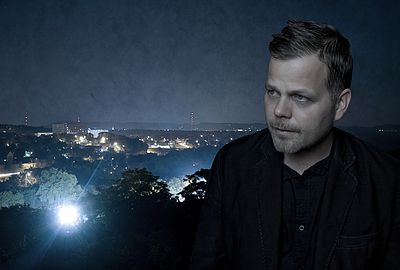By J. Scott Bugher

Photo by Scott Simontacchi
Matthew Ryan will be on tour from November 12th through December 7th. Check where he’ll be appearing and keep up with his website for updates and news.
To purchase In the Dusk of Everything, visit the iTunes store HERE.
Just a couple weeks back, Matthew Ryan released his new record, In the Dusk of Everything. After picking up a copy and giving it a spin, I knew I was listening a singer-songwriter well-versed in the literary arts. When looking into Ryan’s work, it’s common to find him categorized with other songwriters like Waits and Dylan, but as a lyricist, I see several literary influences. For example, Raymond Carver and his use of dirty realism when writing about the crude nature of love. I’d suggest reading Gazebo to know what I’m talking about.
In the Dusk of Everything, as a whole, is written like a chronicle with a solid story arc. The record begins with a somber instrumental prelude performed on cello, which presages the drama. Exposition starts with track two, “And So It Goes,” and tension rises from there with the song blatantly titled, “I Hate Everyone.” Songs of conflict fill the middle portion of the record, which is resolved by a couple of songs about letting go. The album then concludes with “Let’s Wave Goodbye,” leaving the story with a new stasis when Ryan sings, “let’s wave goodbye to who we were and we’ll never be again.”
Author, John O’Hara once said, “They say great themes make great novels…but what these young writers don’t understand is that there is no greater theme than men and women.” Ryan is obviously not one of the young writers O’Hara is referencing. In the Dusk of Everything is a collection of vignettes revolving around choices made by a man and woman together or as individuals, and their choices are the things that cause conflict. Ryan’s “She’s a Sparrow” is a good example of the record’s extended theme. The tune is about a man and how his inner conflicts bring wreckage to a relationship. The narrator says, “time and disappointments took their toll until we both stopped trying, and the summer turned to snow.” The disappointments were a result of a time in the narrator’s life when he, “was lost and turning cruel.” Though he told his love that all that came with the cruelty was not meant for her, she floated away from him like a sparrow, a perfect bird to drive the message home. A sparrow breaking from its shell at birth is a metaphor used by Hermann Hesse in his novel, Demian, to represent one breaking from the shell of self-imposed convention according to literary critic, Robert Newton. The sparrow is also a common prison tattoo that represents freedom in general.
Enough of turning an awesome record into subject matter for research and analysis. I’m just fascinated by Ryan’s lyricism and like to dig deep into well-written lyrics. It was my fascination that prodded me to contact him to discuss his literary influences, and it was a privilege to chat with him. I learned quite a lot about the role art and literature play into his work, plus his feelings about today’s world of art.
When I asked about the type of literature that influences his writing, he said, “I lean towards poetry because it’s so potently distilled.” I followed up by asking if he had any specific poets in mind. He immediately stated, “Wallace Stevens blows me away.” Stevens, a peer of E.E. Cummings and William Carlos Williams, says that, “There is nothing in life except what one thinks of it.” Stevens’ statement is relevant to Ryan’s approach to songwriting. Ryan does not consider himself a craftsman who makes writing a daily task. On writing, he says, “Most of my time is spent living,” and how he views and experiences life is what triggers “the flow,” a term Lucinda Williams introduced to Ryan. Songs will come by “making yourself available to the flow of what comes,” according to Ryan. It’s all about what he thinks of life.
Seamus Heaney is another poet Ryan finds inspiration in. Heaney’s poem, “The Skylight,” moved Ryan to write a song of the same title on his record, Regret Over the Wires. Heaney’s quote on music, “great music, is the music of what happens,” is another statement that supports Ryan’s take on where the flow comes from. Every song on In the Dusk of Everything is based on observations and reflections of Ryan’s life experience, what happens through the course of it.
Near the end of our conversation, Ryan wanted to leave Split Lip’s readers with his feeling about the world of art and literature. He believes people in this world that operates like it’s trying to beat its high score need to, “slow down a little and engage in the higher arts because the arts today are suffering and it worries me.” I can’t agree more. I recently attended a lecture by Margaret Atwood and the auditorium, that has the capacity to seat two thousand, maybe had three hundred in attendance and that worried me.
Ryan also feels that people might not have a concrete understanding of what higher art really is. He says, “People need to be responsible to discern the difference between engagement in the arts versus entertainment.” And the difference is vast. Consider this — The U.S. government’s 2011-2012 budget cut funding for the National Endowment for the Arts by 13.3%, leaving it with a budget of $146 million to support independent artistic efforts. The production budget for 2007’s Pirates of the Caribbean: At World’s End was $300 million. What are our priorities regarding the arts? Do we want to provide our minds with Hollywood opiates or better ourselves. Ryan told me, “I’m a better person for having read (Don DeLillo’s) White Noise, listening to Leonard Coen and Arvo Part, and watching Cinema Paridso.” Why does Ryan feel this way? In a past interview with American Songwriter, he said, “Great art communicates with those parts of ourselves that maybe we often want to ignore.” Split Lip totally endorses Ryan’s opinions and we want to support his work in the arts as much as possible.
